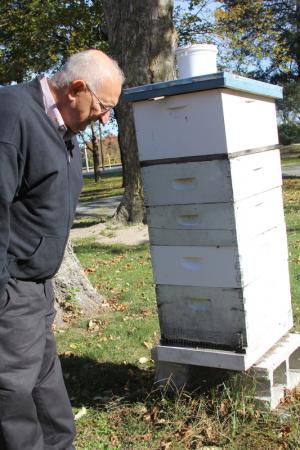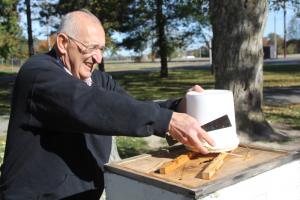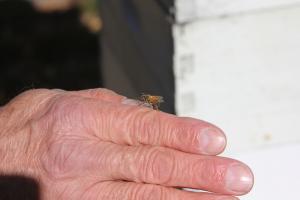Randall Cash: Copier salesman bee-lieves in sustainable farms
Just shy of a PhD, Randall Cash decided to walk away from months of research on British history, and he has never looked back.
“Something happened when I turned 30,” he said. “I was a country bumpkin from Millsboro, but here I was going to Britain to study their history. It was too much of a stretch for my roots.”
Now a Bridgeville resident where he has lived on a 25-acre farm nestled on the Nanticoke River for the past 30 years, Cash sums up his last academic venture as ABD – all but dissertation.
The program he enrolled in at the University of Virginia took him to London, Edinburgh, Birmingham and Manchester for months on end while he learned about the peace movement during the Crimean War.
Not your everyday conversation piece.
“The rationales then were similar to what we heard during the Vietnam War,” he said.
Cash enrolled in the University of Virginia doctoral program after earning two bachelor's degrees from University of Delaware – one in biology and the other in history – as well as a master's degree in history.
Yet the Sussex County native put aside his academic ambitions and settled down not far from where he was part of the first graduating class of Sussex Central High School in 1970.
Back on the Delmarva Peninsula, he became the first executive director of Furnace Town, where he oversaw a process that took iron out of bog ore. Furnace Town factory refined bog ore and smelted it into pig iron bricks, he said.
In a bit of Millsboro lore, Cash said, locals joke that the Liberty Bell was made out of Millsboro bog ore, and that's why it cracked.
Cash worked for a year running Furnace Town before he landed a job in the field he has made a career of for 30 years - copy machine sales.
Today, he covers Sussex County selling Canon copiers to hundreds of clients for Automated Copy Systems Inc.
“I'm selling to the third generation now at some businesses,” he said.
Apiary aspirations
As a boy growing up in the Millsboro area, Cash said, he always wanted his own beehive. His father, a well-known watermelon farmer, disagreed.
“There were a lot of wild bees back then, and he didn't see the need to have our own beehive,” Cash said. “Finally, when I had my property in Bridgeville, I said, 'I'm going to get some bees.'”
He now has 12 beehives; all but one are on his property. The lone hive sits on a Seaford property across the street from the Ross Mansion. On a chilly Nov. 4, Cash tended to his Seaford bees, preparing them for the winter. He weighted a top to protect the hive from the cold weather after feeding them a diet of sugar water throughout the fall. The bees will hunker down inside the hive during the winter. As an extra preventative to keep them healthy, Cash installed a tray on the bottom of the hive to collect varroa mites that normally fall off bees when they clean themselves. Emptying the tray on a regular basis will keep the mites from infesting the hive.
The bees at Cash's Seaford hive are Italian bees known for their gentle behavior.
“They're the best,” he said proudly.
Another type of bee - the Russian bee - is known for keeping itself clean, so a cross between Italian and Russian bees could make for a nice, tidy breed, he said.
With a cat-that-ate-the-canary smile, the avowed apiary hobbyist claims his bees are behind the success of a couple of Bridgeville wines - Blazing Peach wine and Black Twig wine.
“My bees fly throughout the area and could have pollinated the fruits used to make the wines,” he said.
Even if they didn't, his bees produce dozens of pints of honey a year and are thriving - in contrast to a national trend.
Colony Collapse Disorder has threatened crops across the country, most notably the almond crop of California. There, beekeepers could not supply enough bees to pollinate the almond trees.
Cash said some people blame dying bees on nicotine-based pesticides referred to as neonicotinoids. Others say varroa mites and small hive beetles have destroyed bee colonies. Cash said his theory is that it is a combination of causes with loss of habitat ranking high. The overall loss of habitat and resulting constrictive diet has probably damaged bees more than any other outside threat, he said.
The fields of Sussex County are not the same as they were when he grew up in the 1960s. Back then, he remembers small farms and fields separated by hedgerows and roads where knee-high wildflowers grew. Many families had big, sustainable vegetable gardens; others had yards full of clover and dandelions. All of this provided wild bees with places to live and plenty of sources of pollen, he said. The floral buffet for today's bees has been drastically reduced by development, mass farming and homeowners who want a perfect green and weedless lawn, he said.
“Sussex County of today is a far cry from that of my youth,” he said.
Cash said recent studies show some pollens are poisonous to bees unless mixed with other types of pollen to neutralize it.
“Reducing a bee's floral habitat is more than removing a few odds and ends from the buffet. It is introducing poisons which are every bit as detrimental as pesticides,” he said.
There's plenty of pollen to choose from on Cash's Honey Tree Farm, which he shares with his wife Virginia.
Not only do wildflowers such as knapweed provide pollen sources on his land, neighboring T.S. Smith and Sons and Evans Farms offer even more pollen variety for his bees.
“Just as we know the best milk comes from contented cows, we know that the best honey comes from contented bees,” he said.
He shares his bees' honey with friends and relatives, and sometimes his two daughters, Jennifer, 39, and Jessica, 31. Jennifer lives in Germany, while Jessica is a bit closer to home in Newark.
Cash said he knows he's doing something right because his bees are multiplying. In the summertime, after a day's work selling copiers, he said, he enjoys going home and watching bees sit on the porches of their beehives after their day's work in the fields.
“It's delightful to walk through the meadow down to the colonies on warm evenings,” he said. “I am reminded of my childhood, when my father and I would sit on the porch of our little farmhouse eating a Charleston Gray watermelon after our own day in the field.”
Melissa Steele is a staff writer covering the state Legislature, government and police. Her newspaper career spans more than 30 years and includes working for the Delaware State News, Burlington County Times, The News Journal, Dover Post and Milford Beacon before coming to the Cape Gazette in 2012. Her work has received numerous awards, most notably a Pulitzer Prize-adjudicated investigative piece, and a runner-up for the MDDC James S. Keat Freedom of Information Award.


























































